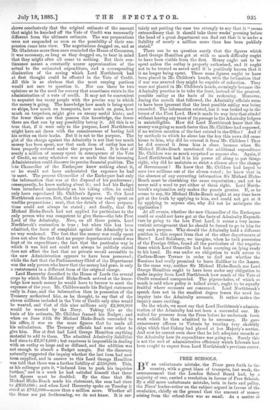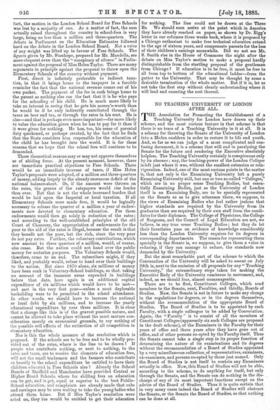FREE SCHOOLS.
BY an unfortunate mistake, the Times gave forth to the country, with a great blare of trumpets, last week, the announcement that the London School Board had, by a majority of one, carried a resolution in favour of Free Schools. By a still more unfortunate mistake, both in facts and policy, the Times' leader-writer on the subject argued in favour of the resolution, chiefly on the ground that the amount of money arising from the school-fees was so small. As a matter of
fact, the motion in the London School Board for Free Schools was lost by a majority of one. As a matter of fact, the sum actually raised throughout the country in school-fees is very large, being no less than a million and three-quarters. The debate in Parliament on the Education Estimates followed hard on the debate in the London School Board. Not a voice of any weight was lifted up in favour of Free Schools. The figures given by Mr. Stanhope, prepared for Mr. Mundella, are more eloquent even than the conspiracy of silence" in Parlia- ment against the proposal of Miss Helen Taylor. There are many arguments in principle against the proposal to throw open the Elementary Schools of the country without payment.
First, direct is infinitely preferable to indirect taxa- tion, in that it hrings home to the taxpayer in a forcible reminder the fact that the national revenue comes out of his own pocket. The payment of the fee in cash brings home to the parent as nothing else can the fact that it is he who pays for the schooling of his child. He is much more likely to take an interest in seeing that he gets his money's-worth than he would be if he only indirectly contributed through the taxes on beer and tea, or through the rates in his rent. He is also—and that is perhaps even more important—far more likely to value the education given when he has to pay for it than if it were given for nothing. He has, too, his sense of parental duty quickened, or perhaps created, by the fact that he finds that the State considers him responsible for the education of the child he has brought into the world. It is for these reasons that we hope that the school fees will continue to be demanded.
These theoretical reasons may or may not approve themselves as of abiding force. At the present moment, however, there are immediate piactical objections to Free Schools. There would be an immediate increase of taxes, if Miss Helen Taylor's proposals were adopted, of a million and three-quarters of money, adding largely to the already enormous deficit of the national balance-sheet. Or, if the amount were thrown on the rates, the groans of the ratepayers would rise louder than ever. But that is not the whole increased burden that would be laid upon the Imperial or local taxation. If all Elementary Schools were made free, it would be logically necessary to release the quarter of a million a year of endow- ments now devoted to elementary education. For these endowments would then go solely in reduction of the rates ; and according to the well-established principles of the old Court of Chancery, the appropriation of endowments for the poor to the aid of the rates is illegal, because the result is that they benefit not the poor, but the rich, since the very poor do not pay rates. Further, the voluntary contributions, which now amount to three quarters of a million, would, of course, also cease. But the nation could not hand over the public money for sectarian purposes. The Voluntary Schools would, therefore, come to an end. The subscribers might, if they liked, and probably would, refuse to hand over their buildings to the nation. But since 1870 alone, six millions of money have been sunk in Voluntary-School buildings, so that, taking no account of the immense sums expended in buildings before that date, here again is an additional capital expenditure of six millions which would have to be met— and met in the very first year—unless a most deplorable backsliding were to be permitted in the school attendance. In other words, we should have to increase the national or local debt by six millions, and to increase the yearly educational expenditure by rear three millions. It is clear that a change like this is of the gravest possible nature, and cannot be allowed to take place without the most mature con- sideration merely on economical grounds, to say nothing of the possible evil effects of the extinction of all competition in elementary education. Nor is this the whole measure of the resolution which is proposed. If the schools are to be free and to be wholly pro- vided out of the rates, where is the line to be drawn? If people who contribute nothing, or next to nothing, to the rates and taxes, are to receive the elements of education free, will not the small tradesmen and the farmers who contribute so heavily to the school expenditure be entitled to have their children educated in Free Schools also ? Already the School Boards of Sheffield and Manchester have provided Central or Higher Board Schools, where for shilling fees an education can be got, and is got, equal or superior to the best Public- School education, and complaints are already made that cabs and carriages may be seen waiting to take the young ladies who attend them home. But if Miss Taylor's resolution were acted on, they too would be entitled to get their education for nothing. The line could not be drawn at the Three Re. We should soon arrive at the point which in America they have already reached on paper, as shown by Dr. Rigg's letter in our columns three weeks back, where it is proposed by a Chicago enthusiast to make free technical education extend to the age of sixteen years, and compensate parents for the loss of their children's earnings meanwhile. Did we not see Mr. S. Smith rise in the House of Commons the night after the debate on Miss Taylor's motion to make a proposal hardly distinguishable from the startling proposal of the gentleman from Chicago If education is to be free, it must be free to all from top to bottom of the educational ladder—from the gutter to the University. That may be thought by some a desirable termination af the whole matter. But if it is, let us not take the first step without clearly understanding where it will lead and counting the cost thereof.



































 Previous page
Previous page